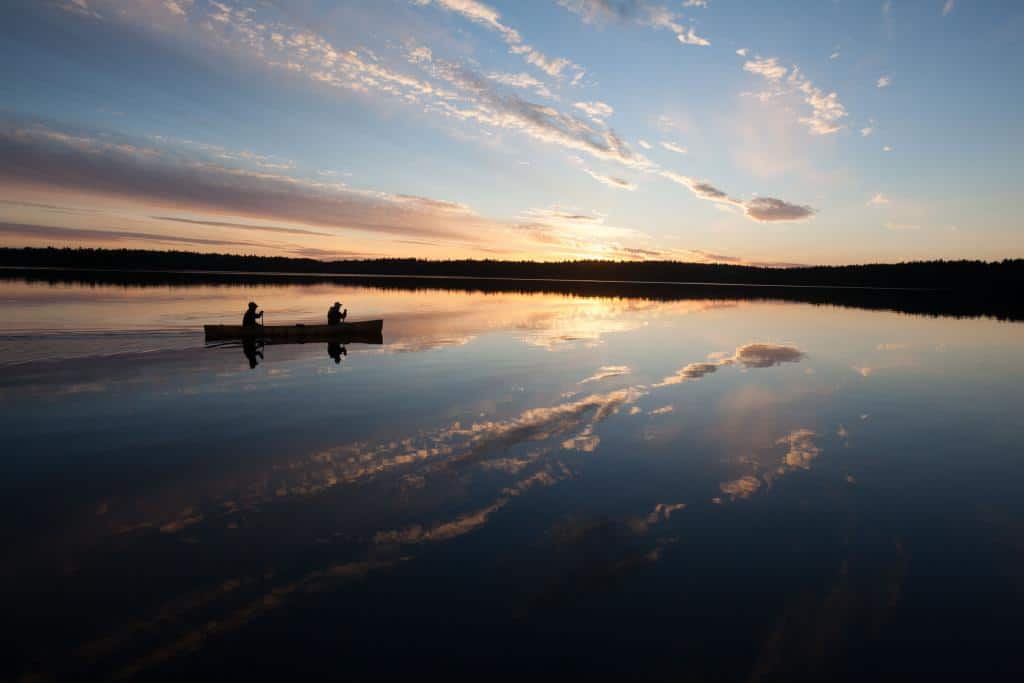
Judges from Minnesota and courts beyond have issued important decisions in three mining-related cases in recent days. The rulings all came in lawsuits filed by groups seeking to protect the Boundary Waters Canoe Area Wilderness.
Minnesota mining rules
The Minnesota Department of Natural Resources will review whether or not the state’s mining regulations adequately protect the Boundary Waters Canoe Area Wilderness. That is the outcome after Ramsey County circuit court judge Laura Nelson rejected a challenge to the plan from mining company Twin Metals.
The agreement arose from a lawsuit by the Campaign to Save the Boundary Waters, which sought to force the DNR to prohibit copper-nickel mining upstream of the wilderness. Last fall, the group dropped the suit in exchange for the DNR assessing if the existing rules are enough to prevent pollution from contaminating the Boundary Waters.
Prohibiting mining in the Rainy Rivers Headwaters, which flows into the Boundary Waters, would be an extension of other rules already on the books. For example, mining inside the Boundary Waters, within a quarter mile of its border, and in corridors like the Echo Trail, Fernberg Road, and Gunflint Trail, is already prohibited. The mine siting rules require the state to prevent harm.
“Mining shall be conducted on sites that minimize adverse impacts on natural resources and the public,” the siting section begins. “Separations shall be maintained between mining areas and adjacent conflicting land uses.”
The rules were put in place in the early 1990s and have never been tested. Twin Metals’ mine proposal on the South Kawishiwi River, could cause pollution. Critics say the price of failure is too high upstream of the Boundary Waters, and the only way to protect the wilderness is to prevent mining in its watershed.
“With the ruling today Minnesotans will have the opportunity to demonstrate that the state’s rules regulating where it is appropriate to conduct risky mining are not sufficient to protect the Boundary Waters and all that it provides our great state and nation,” said Tom Landwehr, Executive Director of the Campaign to Save the Boundary Waters.
The review process will include an opportunity for public comment. Evaluating the rules and possibly adjusting them is expected to take several years.
Prospecting permits
Another Trump administration action on mining may be overturned after an agreement was reached between Save the Boundary Waters and the Center for Biological Diversity. The Bureau of Land Management has agreed to review the renewal of permits issued to Twin Metals to explore on federal land outside its current ore deposit. The agency had reversed an Obama administration decision, and will now revisit the reversal.
“…Federal officials now appear focused on rational, science-based decision making,” said Marc Fink, a senior attorney at the Center for Biological Diversity. “A thorough scientific analysis of these permits and Twin Metals’ related proposals will show that a massive copper-sulfide mine just upstream from the spectacular Boundary Waters wilderness is simply too great a risk.”
The BLM will begin a scientific review of the possible damage done by allowing prospecting in the area. It will consider the mineral extraction leases that could be used if prospecting turns up valuable deposits. The review will include an environmental and endangered species analysis.
At that point, the Forest Service could refuse to consent to the permits and the BLM could cancel them.
Federal mineral leases
Despite a legal challenge, Twin Metals has hung on to the actual leases the Chilean company needs for its proposed mine. Renewal of the leases had been challenged by the Voyageur Outward Bound School, Ely businesses, and environmental groups. The leases are critical to allowing the company to extract publicly-owned minerals from under National Forest lands. Opposing organizations say the lease renewal was based on inadequate environmental review.
The plaintiffs argued that the Interior Department under President Trump changed its mind not because of facts, science, or law, but due to lobbying by members of Congress and Twin Metals. They say they have evidence of Reps. Tom Emmer and other officials using their influence to get the renewals.
U.S. District Judge Trevor McFadden ruled on May 13 that the reversal was instead a reasonable “error correction.” “When the parties were last before the Court, it had to answer the question of when do federal agencies get a mulligan. The Court determined that the Department of the Interior ‘timely corrected an error that would have deprived [Defendant-Intervernors] Twin Metals of its right to valuable leases,'” the court order reads. “Plaintiffs now ask the Court to take a mulligan of its own. They move under Federal Rule of Civil Procedure 60(b) for relief from the Court’s judgment based on newly discovered evidence. Because Plaintiffs have failed to show that the new evidence would have probably changed the outcome, the Court will deny the motion.”
While that means the lease renewal stands, the ore may still be off-limits if state mining rules are changed, or less profitable if prospecting and expansion is prohibited.
More information:
- Agreement Reached on Mining Exploration Permits Near Boundary Waters Wilderness in Minnesota – Center for Biological Diversity
- Judge denies Twin Metals request to block review of state mining rules – The Timberjay
- Minnesota Administrative Rules: Chapter 6132, Nonferrous Metallic Mineral Mining
- Ruling: Voyageurs Outward Bound School vs. United States & Twin Metals Minnesota LLC – U.S. District Court for the District of Columbia (PDF)
- Ruling: Northeastern Minnesotans for Wilderness vs. Minnesota Department of Natural Resources & Twin Metals Minnesota LLC – Ramsey County District Court (PDF)

